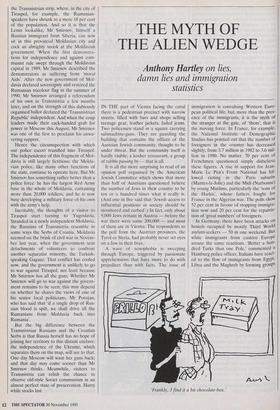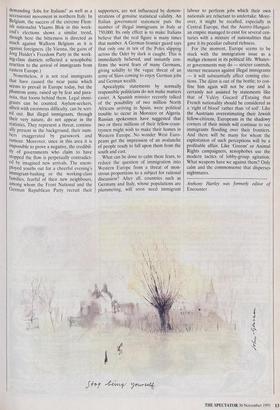THE MYTH OF THE ALIEN WEDGE
Anthony Hartley on lies,
damn lies and immigration statistics
IN THE part of Vienna facing the canal there is a pedestrian precinct with narrow streets, filled with bars and shops selling teenage gear, leather jackets, faded jeans. Two policemen stand in a square carrying submachine-guns. They are guarding the building that contains the offices of the Austrian Jewish community, thought to be under threat. But the community itself is hardly visible; a kosher restaurant, a group of rabbis passing by — that is all.
It is all the more surprising to read of an opinion poll organised by the American Jewish Committee which shows that more than half of Austrians questioned believe the number of Jews in their country to be ten or a hundred times what it really is. (And one in five said that 'Jewish access to influential positions in society should be monitored and curbed'.) In fact, only about 9,000 Jews remain in Austria — before the war there were some 200,000 — and most of them are in Vienna. The respondents to the poll from the Austrian provinces, the Tyrol or Styria, had probably never set eyes on a Jew in their lives.
A wave of xenophobia is sweeping through Europe, triggered by passionate apprehensions that have more to do with prejudices than with facts. The issue of
immigration is convulsing Western Euro- pean political life, but, more than the pres- ence of the immigrants, it is the myth of the stranger at the gate, of 'them', that is the moving force. In France, for example, the National Institute of Demographic Studies has pointed out that the number of foreigners in the country has decreased slightly, from 3.7 million in 1982 to 3,6 mil- lion in 1990. No matter. 70 per cent of Frenchmen questioned simply disbelieve these figures. A rise in support for Jean- Marie Le Pen's Front National has fol- lowed rioting in the Paris suburbs (Mantes-la-Jolie) and the Midi (Narbonne) by young Muslims, particularly the 'sons of the Harkis', whose fathers fought for France in the Algerian war. The polls show 52 per cent in favour of stopping immigra- tion now and 20 per cent for the repatria- tion of 'great numbers' of foreigners.
In Germany, there have been attacks on hostels occupied by mostly Third World asylum-seekers — 50 in one weekend. But white immigrants from eastern Europe arouse the same reactions. 'Better a hun- dred Turks than one Pole,' commented a Hamburg police officer. Italians have react- ed to the flow of immigrants from Egypt, Libya and the Maghreb by forming groups `Frankly, I find it a bit chocolate-box.' demanding 'Jobs for Italians!' as well as a secessionist movement in northern Italy. In Belgium, the success of the extreme Flem- ish nationalist Vlaams Blok in this week- end's elections shows a similar trend, though here the bitterness is directed as much against Walloon Belgians as it is against foreigners. (In Vienna, the gains of Jorg Haider's Freedom Party in the work- ing-class districts reflected a xenophobic reaction to the arrival of immigrants from eastern Europe.) Nonetheless, it is not real immigrants that have caused the near panic which seems to prevail in Europe today, but the phantom army, raised up by fear and para- noia, that looms behind them. Legal immi- grants can be counted. Asylum-seekers, albeit with enormous difficulty, can be sort- ed out. But illegal immigrants, through their very nature, do not appear in the statistics. They represent a threat, continu- ally present in the background, their num- bers exaggerated by guesswork and rumour. Moreover, since in this area it is impossible to prove a negative, the credibil- ity of governments who claim tb have stopped the flow is perpetually contradict- ed by imagined new arrivals. The unem- ployed youths out for a cheerful evening's Immigrant-bashing or the working-class families, fearful of their new neighbours, among whom the Front National and the German Republican Party recruit their supporters, are not influenced by demon- strations of genuine statistical validity. An Italian government statement puts the number of illegal immigrants in Italy at 750,000. Its only effect is to make Italians believe that the real figure is many times that number. A German frontier guard says that only one in ten of the Poles slipping across the Oder by dark is caught. This is immediately believed, and instantly con- firms the worst fears of many Germans, giving solidity to the vague threat of an army of Slays coming to enjoy German jobs and German wealth.
Apocalyptic statements by normally responsible politicians do not make matters easier. A Spanish minister recently talked of the possibility of two million North Africans arriving in Spain, were political trouble to occur in Morocco or Algeria. Russian spokesmen have suggested that two or three millions of their fellow-coun- trymen might wish to make their homes in Western Europe. No wonder West Euro- peans get the impression of an avalanche of people ready to fall upon them from the south and east.
What can be done to calm these fears, to reduce the question of immigration into Western Europe from a threat of mon- strous proportions to a subject for rational discussion? After all, countries such as Germany and Italy, whose populations are plummeting, will soon need immigrant labour to perform jobs which their own nationals are reluctant to undertake. More- over, it might be recalled, especially in Central Europe, that the Austro-Hungari- an empire managed to exist for several cen- turies with a mixture of nationalities that gave it its peculiar cultural richness.
For the moment, Europe seems to be stuck with the immigration issue as a malign element in its political life. Whatev- er governments may do — stricter controls, sterner measures against illegal immigrants — it will substantially affect coming elec- tions. The djinn is out of the bottle; to con- fine him again will not be easy and is certainly not assisted by statements like that of Valery Giscard d'Estaing that French nationality should be considered as a 'right of blood' rather than 'of soil'. Like the Austrians overestimating their Jewish fellow-citizens, Europeans in the shadowy corners of their minds will continue to see immigrants flooding over their frontiers. And there will be many for whom the exploitation of such perceptions will be a profitable affair. Like 'Greens' or Animal Rights campaigners, xenophobes use the modern tactics of lobby-group agitation. What weapons have we against them? Only calm and the commonsense that disperses nightmares.
Anthony Hartley was formerly editor of Encounter











































































 Previous page
Previous page